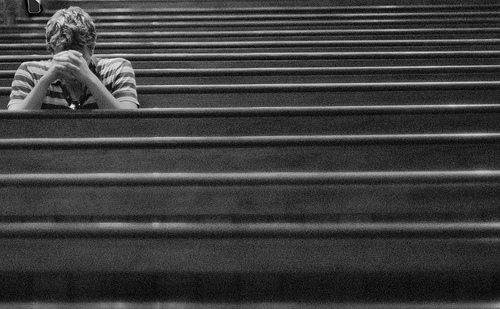The Nicene Creed: “One Church”
**This post is part of a series reflecting on the Nicene Creed**
| << Previous post | View series | Next post >> |
“And we believe in one holy catholic and apostolic Church.”
“Pope Says Having A Personal Relationship With Jesus Is Dangerous” ran the headline. Of course, the Pope had said nothing of the sort. He had only called dangerous the temptation to think that you can “go it alone” in your faith, without the support of others, a statement with which most Protestants would heartily agree.[1]
But the accusation points to a crucial question with which the Pope and his accusers probably nonetheless differ: Is Christian faith communal by its very nature, or only by accident? Can someone be authentically Christian, a true disciple of Christ, if they have nothing to do with the Church?
At first sight the answer would seem that faith can be individual. Believing in Jesus and following his teaching matters more than going to church services. Aren’t there millions of hypocrites who attend church but don’t really live their faith the rest of the week? How will God judge us in eternity: by whether we sat on a pew once a Sunday or whether we obeyed Jesus with our whole hearts and lives?
However, closer inspection reveals that it is harder to separate our personal faith from those around us than we might think – both in their influence on what we believe and practice, and in the sustaining effect of sharing our spiritual journey with others.
- It is clear all over Scripture that following Jesus involves belonging to the community of his followers.
- Our very knowledge of Jesus comes from gospels selected by the community. To prioritize these gospels is to submit to the judgment of the “holy catholic church” spoken in the creeds.[2]
- Our understanding of the gospels quickly goes astray without the corrective guidance of other interpreters, past and present, near and far.
- Regular church attendance is to the spirit as vegetables are to the body: it’s not fun or exciting, and the effects are more visible over decades than years. But eventually it is decisive for your health.
But I want to quickly add that for those who want to be Jesus-followers without church, the issue is not only a matter of theological debate. Many people have been hurt by their church communities, through legalism, feeling judged, or simply not feeling welcome or at home in those communities. Arguing about the importance of church is grossly insufficient in these cases. We need other responses which may cost more energy and comfort on the part of existing church members.
Jesus came to found a community with himself at the center. He sometimes referred to this community as the church, sometimes the Kingdom of God, sometimes the Kingdom of Heaven. He spent much of his time describing what this community would look like and how people should treat each other. Mark 10:42-43 is one of its most challenging features: to be marked by humble mutual service, especially by those in authority.
It is hard to commit to walking with others when their tastes and opinions differ from our own. We might often want to split off and go our separate ways. But one of the fastest ways to become like Jesus is to live in committed community in spite of the frustrations and annoyances we all cause one another. Jesus wanted us to learn to love one another and stay united. Why? Because this is the greatest testimony of his love that we can offer (John 17:23).
[1] You can find the English text here, and the original Italian here. Pope Francis was also accused of calling this individual-faith attitude “wrong” when a better translation would be that it “doesn’t work.” He was not making a moral judgment but an empirical observation: being individualist in your faith always fails in the long run.
[2] There is a certain circularity here. The Church gave us the Bible, in which we are told to belong to the Church. Could it be that the Church added those Bible verses in order to keep power over us? All I will say here is that the possibility cannot be ruled out, but that the suspicion can flow both ways. It’s equally likely that my desire for autonomy leads me to prefer the idea of a corrupt Church from which I must free myself.
Barney
Latest posts by Barney (see all)
- The Nicene Creed: “One Church” - July 14, 2016
- The Nicene Creed: “…for us and for our salvation…” - June 24, 2016
- Pacifism and Politics: The Tank and the Letter - May 3, 2016

